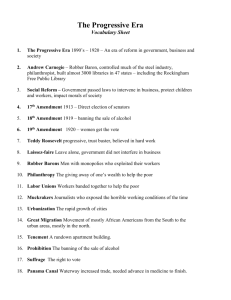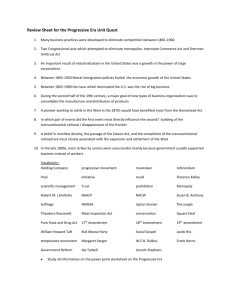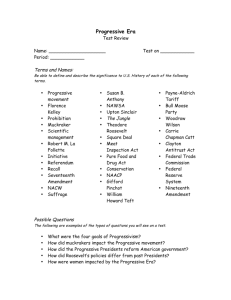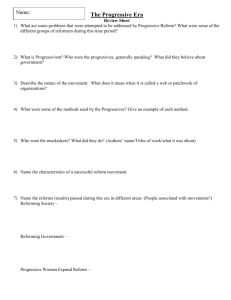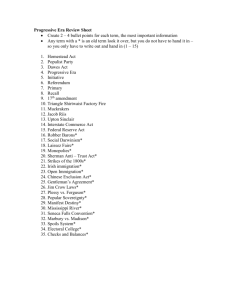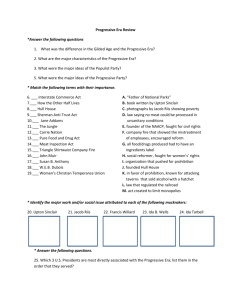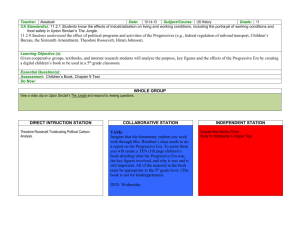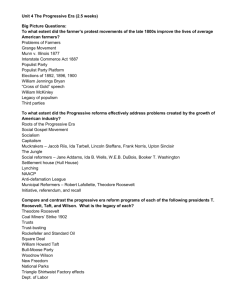Review Sheet
advertisement
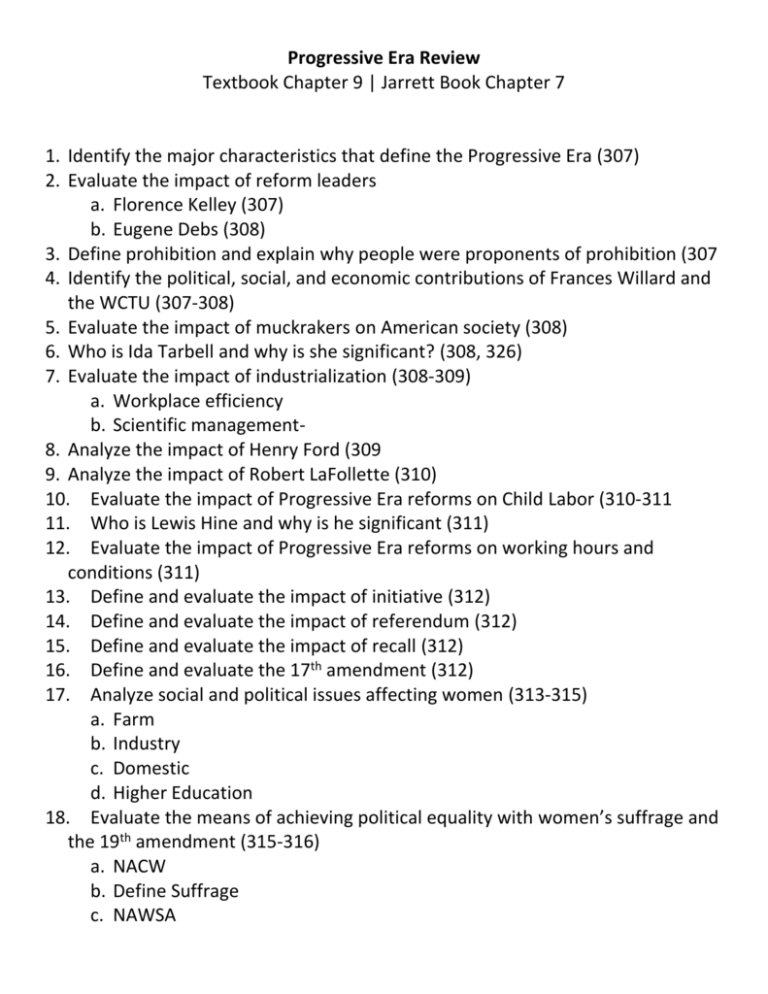
Progressive Era Review Textbook Chapter 9 | Jarrett Book Chapter 7 1. Identify the major characteristics that define the Progressive Era (307) 2. Evaluate the impact of reform leaders a. Florence Kelley (307) b. Eugene Debs (308) 3. Define prohibition and explain why people were proponents of prohibition (307 4. Identify the political, social, and economic contributions of Frances Willard and the WCTU (307-308) 5. Evaluate the impact of muckrakers on American society (308) 6. Who is Ida Tarbell and why is she significant? (308, 326) 7. Evaluate the impact of industrialization (308-309) a. Workplace efficiency b. Scientific management8. Analyze the impact of Henry Ford (309 9. Analyze the impact of Robert LaFollette (310) 10. Evaluate the impact of Progressive Era reforms on Child Labor (310-311 11. Who is Lewis Hine and why is he significant (311) 12. Evaluate the impact of Progressive Era reforms on working hours and conditions (311) 13. Define and evaluate the impact of initiative (312) 14. Define and evaluate the impact of referendum (312) 15. Define and evaluate the impact of recall (312) 16. Define and evaluate the 17th amendment (312) 17. Analyze social and political issues affecting women (313-315) a. Farm b. Industry c. Domestic d. Higher Education 18. Evaluate the means of achieving political equality with women’s suffrage and the 19th amendment (315-316) a. NACW b. Define Suffrage c. NAWSA 19. Evaluate the impact of Susan B. Anthony (315-316) 20. Outline and describe the three-part strategy for suffrage (316) a. b. c. 21. Outline the 5 tactics of Carrie Champan Catt and the NAWSA (335) a. b. c. d. e. 22. Define and evaluate the 19th amendment 23. Outline and describe Roosevelt’s Square Deal (319) 24. What was the 1902 Coal Strike and why was Roosevelt’s involvement unprecedented? (320) 25. Describe the effectiveness of the following anti-trust acts a. Sherman Antitrust Act (319) b. ICA & ICC (320) c. Elkins Act (320) d. Hepburn Act (320) 26. Evaluate the impact of Upton Sinclair (317, 327) 27. Describe the costs and benefits of the Meat Inspection Act (320) 28. Describe the costs and benefits of the Pure Food and Drug Act (322) 29. How do these two acts demonstrate the changing relationship between the federal government and private business? (322) 30. Identify the roles of governmental entities and/or private citizens in managing the environment (322-324, 328) a. Yellowstone National Park b. U.S. Forest Bureau & forest reserves c. Exploitation of natural environment d. John Muir e. Gifford Pinchot f. National Reclamation Act & Newlands Act 31. Identify the roles of National Park System 32. Explain how the differing views of Booker T. Washington and W.E.B. DuBois intensified throughout the Progressive Era (325) 33. What are the goals of the NAACP? (325) 34. Taft – a Progressive President? (329-330) a. Trust Busting b. Payne-Aldrich Tariff c. Disputing Public Lands 35. What was the Progressive Party/Bull Moose Party? Why was it created? (330) 36. What was the Progressive Party platform? (330) 37. Describe the Presidential Election of 1912 (330-331) 38. Evaluate the long-term impact of Progressive Party (330) 39. Wilson’s Antitrust Measures (333) a. Clayton Antitrust Act b. Federal Trade Commission (FTC) 40. Define and evaluate the 16th amendment (334) 41. Describe the emergence of monetary policy in the United States (334) 42. Define and analyze the Federal Reserve Act of 1913 (334)
